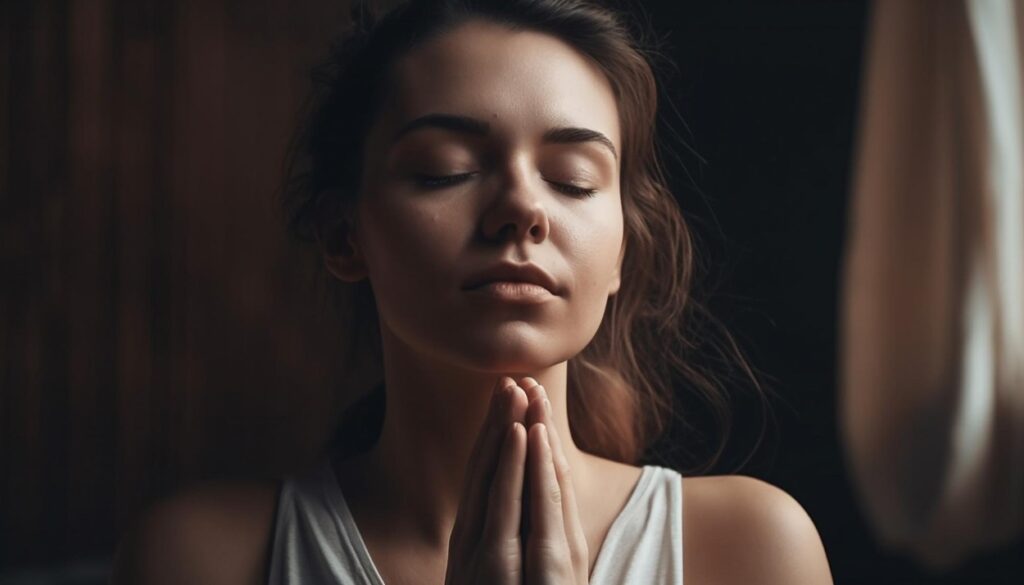Mindfulness Meditation for Sleep and Anxiety:
Mindfulness meditation has emerged as a powerful tool in managing sleep disorders and anxiety. By focusing on the present moment and acknowledging thoughts and feelings without judgment, mindfulness meditation can help alleviate the symptoms of anxiety and promote better sleep.
Related Article: The Art of Mindful Meditation: A Journey to Inner Peace

The Link Between Mindfulness, Sleep, and Anxiety
Anxiety and sleep disturbances often go hand in hand. Anxiety can make it difficult to fall asleep or stay asleep, while poor sleep can exacerbate anxiety. Mindfulness meditation addresses both issues by calming the mind and preparing the body for rest.
Key Techniques in Mindfulness Meditation for Sleep
- Body Scan Meditation: This involves slowly focusing attention on different parts of the body, from the toes to the head, noting any sensations or tensions and consciously relaxing them.
- Breath Awareness: Concentrating on the rhythm of your breath helps anchor your mind in the present, reducing anxious thoughts and inducing relaxation.
- Guided Imagery: Visualization of calming images or scenarios can divert the mind from stressful thoughts, easing into a state conducive to sleep.
Incorporating Mindfulness into Your Nightly Routine
Creating a pre-sleep routine that includes mindfulness meditation can signal to your body that it’s time to wind down. This might include a brief meditation session, dimming the lights, and limiting screen time an hour before bed.
Mindfulness Meditation for Daytime Anxiety
In addition to its benefits for sleep, mindfulness meditation can be an effective daytime practice for managing anxiety. Regular practice can help lower overall stress levels, making it easier to relax at night.
The Role of Mindfulness Apps and Audio Guides
For beginners, guided mindfulness meditation apps or audio tracks can be particularly helpful. These guides often include specific meditations for sleep and anxiety, providing easy-to-follow instructions and soothing sounds.
Long-term Benefits and Practice
Consistent practice of mindfulness meditation can lead to long-term improvements in sleep quality and anxiety management. It’s a skill that develops over time, with cumulative benefits for mental and physical health.
Mindfulness Meditation Techniques for Deep Relaxation
Deep relaxation is a key component in managing sleep and anxiety. Mindfulness meditation can be enhanced with techniques specifically aimed at deep relaxation:
- Progressive Muscle Relaxation: This involves tensing and then relaxing different muscle groups in the body, combined with mindful breathing. This technique not only aids in releasing physical tension but also calms the mind.
- Mindful Listening to Soothing Sounds: Integrating calming sounds or music during meditation can enhance the relaxation experience. Sounds like gentle rain, ocean waves, or soft instrumental music can provide a soothing backdrop to meditation.
- Use of Mantras: Repeating a calming word or phrase during meditation can help focus the mind and alleviate racing thoughts. This can be particularly effective for those whose anxiety interrupts their sleep.
Related Article: Unlock the Secrets of Sound Healing: IAWAKE Review!
The Importance of a Conducive Environment
Creating a conducive environment for sleep is just as important as the meditation practice itself. This includes:
- Creating a Comfortable Sleep Space: Ensure your bedroom is quiet, dark, and cool. Consider the use of comfortable bedding and pillows that support restful sleep.
- Limiting Stimulants: Avoid caffeine and heavy meals close to bedtime. Also, limit exposure to screens and bright lights, as they can interfere with the body’s natural sleep rhythm.
- Establishing a Pre-Sleep Routine: Engage in quiet, calming activities before bed, such as reading, taking a warm bath, or gentle stretching. This helps signal to your body that it’s time to wind down.
Combining Mindfulness with Other Sleep Hygiene Practices
While mindfulness meditation is a powerful tool for improving sleep and reducing anxiety, it’s most effective when combined with good sleep hygiene practices. This includes maintaining a consistent sleep schedule, ensuring adequate exposure to natural light during the day, and engaging in regular physical activity. Mindfulness can be the cornerstone of a holistic approach to sleep and anxiety management, encompassing both mental and physical well-being practices.
Final Thoughts!
Mindfulness meditation for sleep and anxiety offers a path to better sleep and a calmer mind. By incorporating mindfulness practices into your daily routine and creating a sleep-conducive environment, you can significantly improve your sleep quality and manage anxiety more effectively.
Remember, consistency is key, and the benefits of these practices build over time, leading to improved overall health and well-being.




